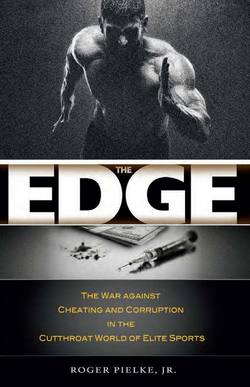Читать книгу The Edge - Roger Pielke - Страница 7
На сайте Литреса книга снята с продажи.
ОглавлениеPreface
Simon Kuper
A few years ago in Paris, I met an American political scientist who had decided to devote his considerable brainpower to sports. Roger Pielke Jr. had spent most of his career working on the politics of climate change. But over a delicious French lunch, he explained that he had almost given up hope of anything being done about that problem.
“That’s exactly how I feel about sport,” I said. The many problems of sporting governance seemed as eternal as death and taxes. Sports authorities governed themselves and didn’t care what the rest of us said. That allowed sports officials to be stupid, pompous, corrupt, or all three. The consequences are the scandals that Pielke charts in this excellent book, from the NFL’s “Deflategate” through the doping that pervades most sports to the bizarre spectacle that is FIFA.
But with hindsight, it seems he was right to be hopeful. As he explains in this book, sport’s age of impunity may now be ending. The dawn raids by Swiss police on FIFA officials in the Baur au Lac hotel in Zurich on May 27, 2015, symbolized a new era: the “autonomy of sport”; the right of sports organizations to do whatever they want has gone. Now is the moment to replace what Pielke calls the outdated values of sports governance: “amateurism, purity, uncertainty, and autonomy.”
Some sports fans may ask why they should care. After all, most of us are a lot more interested in the sports themselves than in the old men who run them. But as Pielke shows, there’s a close link between misrule off the field and cheating on it.
My own favorite example is the Ecuadorean soccer referee Byron Moreno. Upon landing “visibly nervous” at JFK airport in New York in 2010, Moreno was arrested after a customs official found “hard objects on the defendant’s stomach, back, and both of his legs.” Moreno turned out to be carrying ten plastic bags of heroin. He was sentenced to thirty months in a Brooklyn jail, but was released early for good behavior.
In the South Korea–Italy quarterfinal at the World Cup of 2002, Moreno had disallowed a legitimate Italian “golden goal,” given Korea a penalty, and sent off Italy’s Francesco Totti. Moreno personally may have prevented a strong Italian team from winning that World Cup. Three months after the tournament, the Ecuadorean soccer federation gave him a twenty-game ban for an exceptional display of bizarre refereeing that featured (among other things) two controversial penalties, two red cards, and thirteen minutes of extra time. Soon after he returned to soccer in 2003, he was suspended again after sending off three Deportivo Quito players in a game. He then resigned from refereeing.
We now know Moreno was a crook. The question is: Who in FIFA appointed him to referee a crucial World Cup match, and why? And he’s not the only corrupt referee: another of his colleagues at that World Cup, the Chinese Lu Jun, was later jailed in his own country for match fixing.
Fixing is one of the big battlefields Pielke identifies in modern sport, along with amateurism (chiefly in American college sports), doping, technology, and sex testing. The next big issue coming down the pike may be genetically enhanced athletes. Sports authorities as currently constituted are not equipped to make good decisions on any of these issues.
From his years in climate politics, Pielke has a subtle sense of the role of experts in these debates. Science, he notes, can’t “solve” any of these problems. It cannot, for instance, eradicate doping or settle whether the risk of concussion is great enough to justify banning teenagers from playing football. But science can inform the debates and help show sports officials what their options are.
Pielke urges sports to adopt new values: professionalism, pragmatism, transparency, and accountability. Making the shift will require the help of people like him. This is a book that should reach informed experts on sports governance as well as ordinary curious fans. Pielke writes with an academic’s erudition and a journalist’s style and eye for detail. Sport is lucky to have him.
